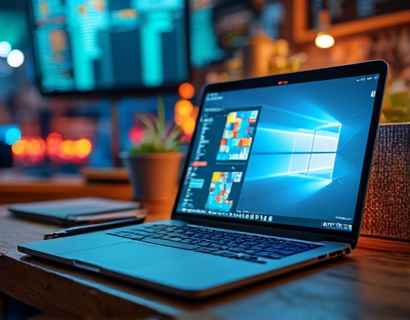Decentralized File Management: Transforming Business Collaboration
In the digital age, the way businesses and teams manage and share files has evolved significantly. Traditional centralized file management systems often face challenges such as security vulnerabilities, single points of failure, and inefficiencies in collaboration. An innovative approach to file management is emerging, one that leverages decentralization to empower businesses and teams with secure, efficient, and user-friendly online solutions. This article delves into the benefits and workings of decentralized file management, highlighting how it can redefine the future of information management.
Understanding Decentralized File Management
Decentralized file management refers to a system where data is not stored in a single central location but is distributed across a network of nodes. Each node in the network has a copy or a part of the data, which ensures that no single entity has control over the entire system. This decentralized architecture offers several advantages over traditional centralized systems.
Firstly, decentralization enhances security. Since data is spread across multiple nodes, the risk of a single point of failure is eliminated. Even if one node is compromised, the rest of the network remains intact, ensuring that critical information remains secure. Additionally, decentralized systems often employ advanced cryptographic techniques to protect data, making it extremely difficult for unauthorized users to access sensitive information.
Key Benefits of Decentralized File Management
The transition to decentralized file management brings a host of benefits that can significantly improve business operations and team collaboration.
Enhanced Security
Security is a paramount concern for any business. Decentralized file management systems address this by distributing data across a network, reducing the risk of data breaches. The use of blockchain technology, a common underlying framework for decentralized systems, ensures that all transactions and data transfers are transparent and immutable. This means that once data is recorded, it cannot be altered or deleted without consensus from the network, providing an additional layer of security.
Moreover, access to files is controlled through cryptographic keys, ensuring that only authorized users can view or modify the data. This granular control over access permissions minimizes the risk of unauthorized access and data leaks.
Improved Efficiency and Productivity
Decentralized file management streamlines workflows and enhances productivity by providing a seamless and efficient way to manage and share files. Traditional centralized systems often suffer from bottlenecks, especially when multiple users need to access or modify the same file simultaneously. In a decentralized system, multiple users can work on the same file concurrently without the need for constant synchronization with a central server.
The decentralized network ensures that all changes are immediately reflected across all nodes, eliminating the need for manual updates and reducing the likelihood of version control issues. This real-time collaboration capability significantly boosts team efficiency and accelerates project completion times.
User-Friendly Interface
One of the most significant advantages of decentralized file management systems is their user-friendly interface. These platforms are designed to be intuitive and easy to use, making them accessible to users of all technical backgrounds. The interface typically features drag-and-drop functionality, simple file upload and sharing options, and a clear organization structure.
Users can easily categorize and tag files, making it straightforward to locate and access the information they need. The intuitive design reduces the learning curve associated with adopting new file management tools, allowing teams to focus on their core tasks rather than navigating complex systems.
Implementing Decentralized File Management in Businesses
For businesses and teams looking to optimize their file management processes, implementing a decentralized solution can be a game-changer. Here’s how to get started:
Choose the Right Platform
The first step is to select a decentralized file management platform that aligns with your business needs. Consider platforms that offer robust security features, scalability, and a user-friendly interface. Research different options, read reviews, and possibly request demos to find the best fit for your organization.
Training and Onboarding
Once a platform is selected, it’s crucial to provide comprehensive training to all team members. Organize workshops or online sessions to familiarize users with the platform’s features and best practices. Ensure that everyone understands how to upload, share, and collaborate on files securely and efficiently.
Creating a detailed user guide or FAQ document can also be helpful for reference. Encouraging feedback and addressing any concerns promptly will help smooth the transition and ensure a smooth adoption process.
Integrating with Existing Workflows
Integrating a decentralized file management system into existing workflows requires careful planning. Identify the specific pain points in your current file management process and determine how the new system can address these issues. For example, if your team frequently collaborates on documents, ensure that the platform’s real-time collaboration features are fully utilized.
Consider setting up templates or workflows within the platform to standardize file management practices. This can include predefined folder structures, access permissions, and naming conventions. Consistency in these practices will enhance efficiency and reduce confusion.
Case Studies and Success Stories
Several businesses and organizations have successfully implemented decentralized file management systems, achieving significant improvements in security, efficiency, and collaboration. Here are a few notable examples:
A large multinational corporation faced frequent data breaches due to its centralized file system. By migrating to a decentralized platform, they reduced the risk of breaches by 80% and improved data access times by 50%. The real-time collaboration features also led to a 30% increase in project completion speeds.
Another example is a creative agency that struggled with version control and file organization. After adopting a decentralized file management solution, the agency reported a 40% reduction in time spent on resolving version conflicts and a 25% increase in client satisfaction due to faster turnaround times.
These success stories demonstrate the tangible benefits of decentralized file management, making it an attractive option for businesses of all sizes.
Future Trends in Decentralized File Management
The landscape of decentralized file management is rapidly evolving, with several trends shaping its future:
Increased Adoption of Blockchain Technology
Blockchain technology continues to play a pivotal role in decentralized file management. Its inherent properties of transparency, immutability, and security make it an ideal foundation for decentralized systems. As more organizations recognize the potential of blockchain, we can expect to see more sophisticated and user-friendly platforms emerge.
Enhanced Interoperability
Future decentralized file management systems will focus on enhancing interoperability, allowing seamless integration with other decentralized applications and platforms. This will create a more connected ecosystem where data can be easily shared and utilized across different services, further boosting productivity and collaboration.
Greater Emphasis on User Privacy
With increasing concerns about data privacy, future decentralized file management solutions will prioritize user privacy. Advanced encryption methods and zero-knowledge proofs will become more prevalent, ensuring that users can manage their data with complete control over who accesses it.
Conclusion
Decentralized file management represents a significant shift in how businesses and teams handle their digital assets. By embracing this innovative approach, organizations can enjoy enhanced security, improved efficiency, and a more collaborative work environment. As the technology continues to mature, the benefits will only become more pronounced, making decentralized file management an essential tool for modern businesses.











































